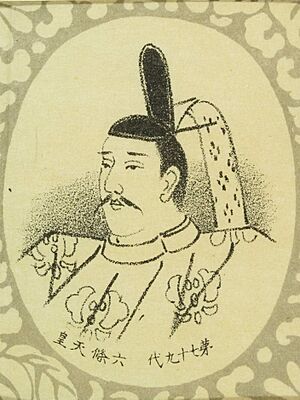Emperor Rokujō facts for kids
Quick facts for kids Emperor Rokujō六条天皇 |
|||||
|---|---|---|---|---|---|
 |
|||||
| Emperor of Japan | |||||
| Reign | August 3, 1165 – April 9, 1168 | ||||
| Coronation | September 4, 1165 | ||||
| Predecessor | Nijō | ||||
| Successor | Takakura | ||||
| Born | December 28, 1164 | ||||
| Died | August 23, 1176 (aged 11) | ||||
| Burial | Seikan-ji no Misasagi (清閑寺陵) (Kyoto) | ||||
|
|||||
| House | Imperial House of Japan | ||||
| Father | Emperor Nijō | ||||
Emperor Rokujō (六条天皇, Rokujō-tennō, December 28, 1164 – August 23, 1176) was the 79th emperor of Japan. He ruled for a short time, from 1165 to 1168. He became emperor when he was very young, just 8 months old.
Contents
Who Was Emperor Rokujō?
Before he became emperor, his personal name was Nobuhito-shinnō. He was the son of Emperor Nijō. Emperor Rokujō did not have any children of his own.
Becoming Emperor at a Young Age
Rokujō was made Crown Prince even before his first birthday. He was officially made emperor when he was only 8 months old.
Here are some important events from his life:
- 1165: Emperor Nijō, Rokujō's father, became very sick. He decided to give up his throne.
- 1165: Rokujō, who was still a baby, became the new emperor. This happened in the 7th year of his father's rule.
- 1165: Shortly after Rokujō became emperor, his father, former-Emperor Nijō, passed away at the age of 22.
Giving Up the Throne
The powerful Taira clan put pressure on Emperor Rokujō to give up his throne. They wanted his uncle to become the new emperor.
- 1168: In the 3rd year of Rokujō's rule, his grandfather, the retired-Emperor Go-Shirakawa, removed him from the throne.
- 1168: Rokujō's uncle, the seventh son of Go-Shirakawa, became the new emperor. He was known as Emperor Takakura.
- 1168: Emperor Takakura officially took over the Chrysanthemum Throne.
Life After the Throne
Emperor Rokujō died when he was only eleven years old. Because he was so young, he did not have a wife or children. While he was emperor, his grandfather, the retired Emperor Go-Shirakawa, was actually in charge of the government. This was called a "cloistered rule."
Rokujō's burial place is called Seikanji no misasagi. It is located in Higashiyama-ku, Kyoto.
Important Advisors
During Emperor Rokujō's reign, there were a few very powerful men who helped run the government. They were called Kugyō (公卿). These men were usually from important families and had a lot of experience.
Some of these top advisors included:
- Sesshō (a type of regent who helped the young emperor): Konoe Motozane and Matsu Motofusa.
- Daijō-daijin (the Chancellor of the Realm, the highest government position): Fujiwara Koremichi and Taira Kiyomori.
- Sadaijin (Minister of the Left): Matsu Motofusa and Ōinomikado Tsunemune.
- Udaijin (Minister of the Right): Kujō Kanezane.
- Nadaijin (Minister of the Center): Fujiwara Tadamasa.
Eras During His Rule
The years of Emperor Rokujō's reign are known by special Japanese era names, or nengō:
See also
- Emperor of Japan
- List of Emperors of Japan
- Imperial cult
 | Valerie Thomas |
 | Frederick McKinley Jones |
 | George Edward Alcorn Jr. |
 | Thomas Mensah |

